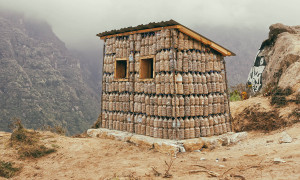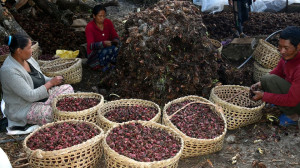Money
Major revenue sources under central govt
The newly-promulgated Constitution of Nepal has put major revenue sources under the central government’s jurisdiction.
The newly-promulgated Constitution of Nepal has put major revenue sources under the central government’s jurisdiction.
They include customs duty, excise duty, value added tax (VAT), corporate income tax, personal income tax, employees compensation tax, passport charges, visa fees, tourism charges, service fees and fines and penalty.
VAT, income tax, customs duty and excise duty are the largest contributors to the government revenue. As per the new constitution, there will be three layers of federal structures—central, provincial and local governments.
The provinces have been given the authority to collect house and land registration fees, vehicles tax, entertainment tax, advertisement tax, tourism and agricultural income tax, service charges and local fines and penalty.
The local governments would look after cooperatives, and raise taxes like property tax, house rent tax, land registration and land tax, advertisement tax, service charge and entertainment tax, among others, at the local level.
Given a more resourceful central government even after federalism, there are doubts whether the provinces would be able to generate enough resources for themselves to sustain.
Economist Bishowmbher Pyakuryal said many provinces would be able to deliver basic social services. “However, they may not ensure efficient development work,” he said.
As per the new constitution, the central bank, planning authority, financial policy, money and banking, monetary policy and foreign assistance will also come under the central government’s purview.
In the initial draft, banks and financial institutions were put under the provinces, but was later changed after the banking sector, including the Nepal Rastra Bank, opposed the provision.
The central bank has been authorised to take decision regarding financial institutions to be set up under the provinces.
Bhuvan Dahal, chief executive officer of Sanima Bank, said provincial governments should be empowered in banking issues before delegating them the authority to look into the financial sector. “As the national level financial institutions have to follow the central bank’s regulation even under the new constitution, we don’t find any difference in expanding our business at grass-root levels,” he said.
The insurance business, however, has been put under the joint purview of both the central and state governments, with the central government devising policies on the sector.
As per the constitution, the central government will also take care of policies and standards related to hydropower conservation and multi-dimensional utility. Inter-country and domestic transmission lines, central statistics management and the national level projects on electricity, irrigation and other big projects also come under the central government’s jurisdiction. International trade, exchange rates, transit ports,
quarantine checks, civil aviation and international airports will also be handled by the central government. Intellectual property rights, including patents,
designs, trademark and copyrights have been put under the central government.
Mines extraction, insurance policy and regulation related with securities and cooperatives, social security and poverty alleviation also come under the central government.
The provincial governments has been authorized to manage province-level projects related to electricity, irrigation, drinking water, transport, local trade, and highway and land management. They can also accept foreign assistance after taking the central government’s consent.
The constitution, however, has authorised both the central and provincial governments in some of the issues. They include supply chain, quality control and price regulation. Development of physical infrastructure and industry, mines and casino operation have been put under both the structures.
The constitution, however, has made it clear provincial and local governments cannot obstruct free flow of goods and services across the provinces and at the local level.
“They should not impose any additional tax, charge or fee with the intention to disrupt their movement across the federal states,” states the constitution.
Cooperatives, rural road, agriculture road and irrigation, agriculture and livestock and animal health have been put under the jurisdiction of local governments. The constitution has also provisioned all three types of governments to handle issues related to cooperatives and agriculture.




 8.12°C Kathmandu
8.12°C Kathmandu












%20(1).jpg&w=300&height=200)
